Leadership Reflection: Analyzing Personal Strengths and Weaknesses
VerifiedAdded on 2021/04/16
|13
|3313
|23
Essay
AI Summary
This reflective essay examines the student's leadership skills through the lens of the Gibbs reflective cycle, focusing on a specific experience during a residential program. The student recounts a scenario where they were hesitant to take on a leadership role in a team activity due to a lack of self-confidence and fear of failure. The essay delves into the student's feelings, evaluations, and analysis of the incident, highlighting the importance of self-confidence, decision-making, and risk-taking abilities in effective leadership. The student identifies personal weaknesses, such as a lack of self-esteem and fear of responsibility, while also acknowledging the positive aspects of self-realization. The essay draws parallels to the leadership style of Richard Branson, emphasizing the role of self-confidence in overcoming challenges. The conclusion discusses alternative approaches to the situation and the importance of developing leadership skills for future professional success.
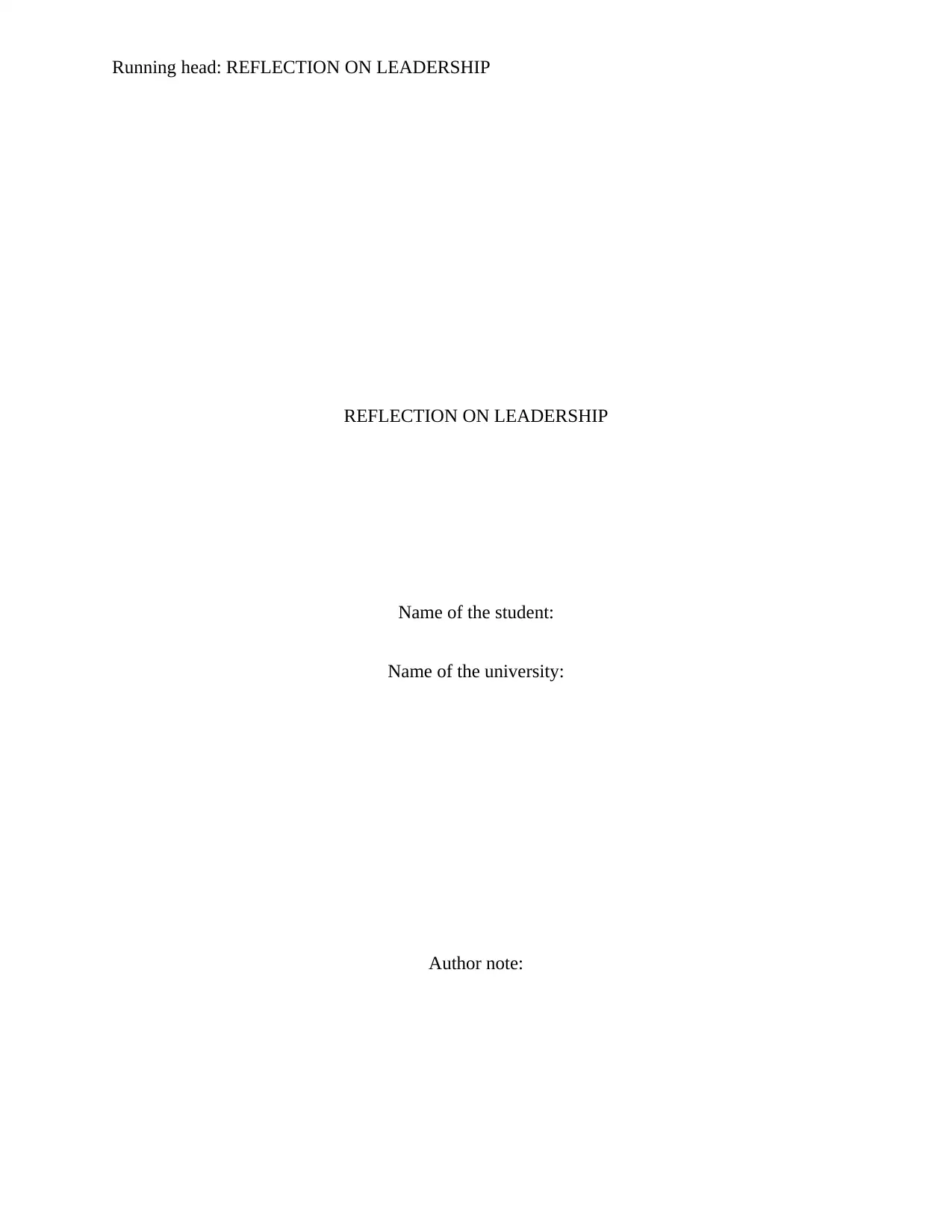
Running head: REFLECTION ON LEADERSHIP
REFLECTION ON LEADERSHIP
Name of the student:
Name of the university:
Author note:
REFLECTION ON LEADERSHIP
Name of the student:
Name of the university:
Author note:
Paraphrase This Document
Need a fresh take? Get an instant paraphrase of this document with our AI Paraphraser
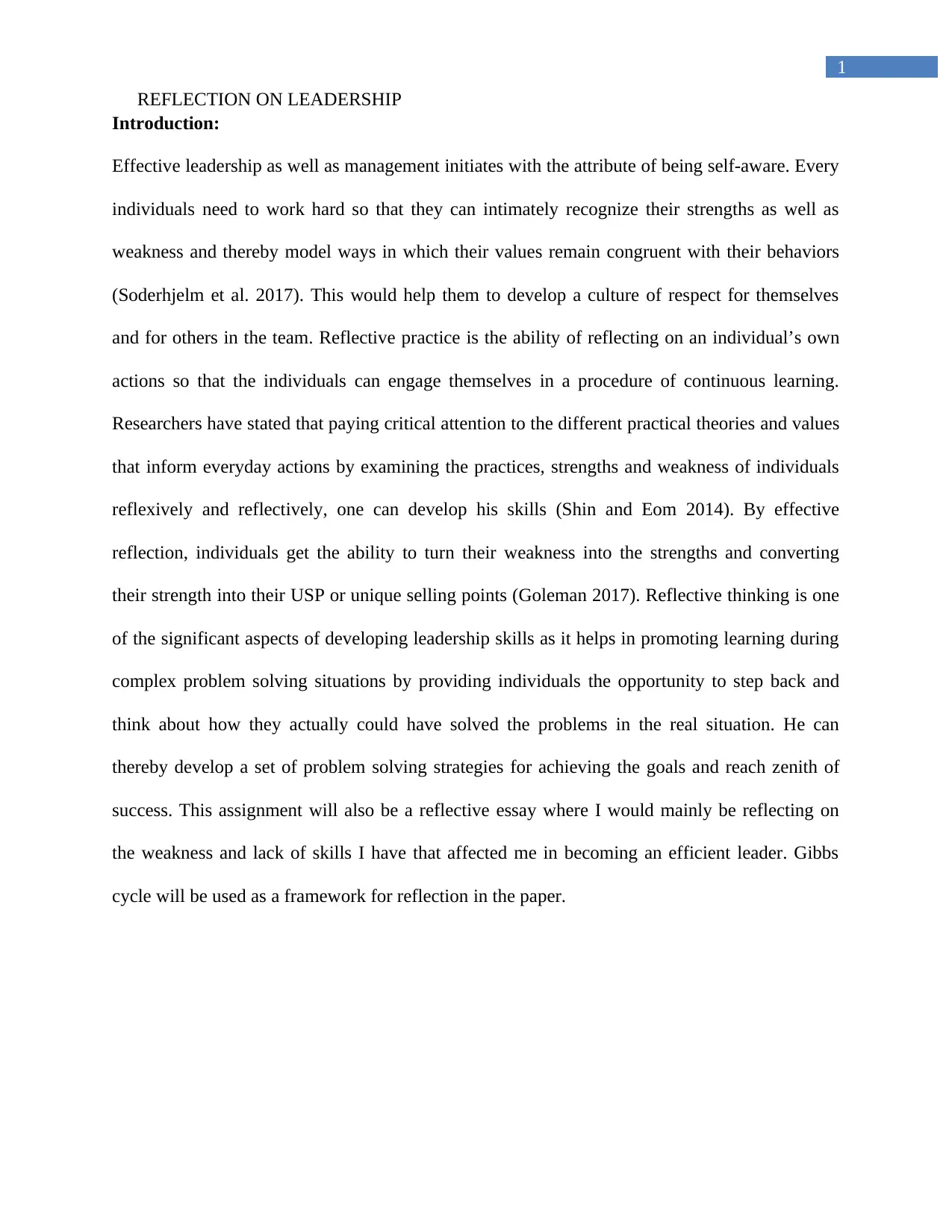
1
REFLECTION ON LEADERSHIP
Introduction:
Effective leadership as well as management initiates with the attribute of being self-aware. Every
individuals need to work hard so that they can intimately recognize their strengths as well as
weakness and thereby model ways in which their values remain congruent with their behaviors
(Soderhjelm et al. 2017). This would help them to develop a culture of respect for themselves
and for others in the team. Reflective practice is the ability of reflecting on an individual’s own
actions so that the individuals can engage themselves in a procedure of continuous learning.
Researchers have stated that paying critical attention to the different practical theories and values
that inform everyday actions by examining the practices, strengths and weakness of individuals
reflexively and reflectively, one can develop his skills (Shin and Eom 2014). By effective
reflection, individuals get the ability to turn their weakness into the strengths and converting
their strength into their USP or unique selling points (Goleman 2017). Reflective thinking is one
of the significant aspects of developing leadership skills as it helps in promoting learning during
complex problem solving situations by providing individuals the opportunity to step back and
think about how they actually could have solved the problems in the real situation. He can
thereby develop a set of problem solving strategies for achieving the goals and reach zenith of
success. This assignment will also be a reflective essay where I would mainly be reflecting on
the weakness and lack of skills I have that affected me in becoming an efficient leader. Gibbs
cycle will be used as a framework for reflection in the paper.
REFLECTION ON LEADERSHIP
Introduction:
Effective leadership as well as management initiates with the attribute of being self-aware. Every
individuals need to work hard so that they can intimately recognize their strengths as well as
weakness and thereby model ways in which their values remain congruent with their behaviors
(Soderhjelm et al. 2017). This would help them to develop a culture of respect for themselves
and for others in the team. Reflective practice is the ability of reflecting on an individual’s own
actions so that the individuals can engage themselves in a procedure of continuous learning.
Researchers have stated that paying critical attention to the different practical theories and values
that inform everyday actions by examining the practices, strengths and weakness of individuals
reflexively and reflectively, one can develop his skills (Shin and Eom 2014). By effective
reflection, individuals get the ability to turn their weakness into the strengths and converting
their strength into their USP or unique selling points (Goleman 2017). Reflective thinking is one
of the significant aspects of developing leadership skills as it helps in promoting learning during
complex problem solving situations by providing individuals the opportunity to step back and
think about how they actually could have solved the problems in the real situation. He can
thereby develop a set of problem solving strategies for achieving the goals and reach zenith of
success. This assignment will also be a reflective essay where I would mainly be reflecting on
the weakness and lack of skills I have that affected me in becoming an efficient leader. Gibbs
cycle will be used as a framework for reflection in the paper.
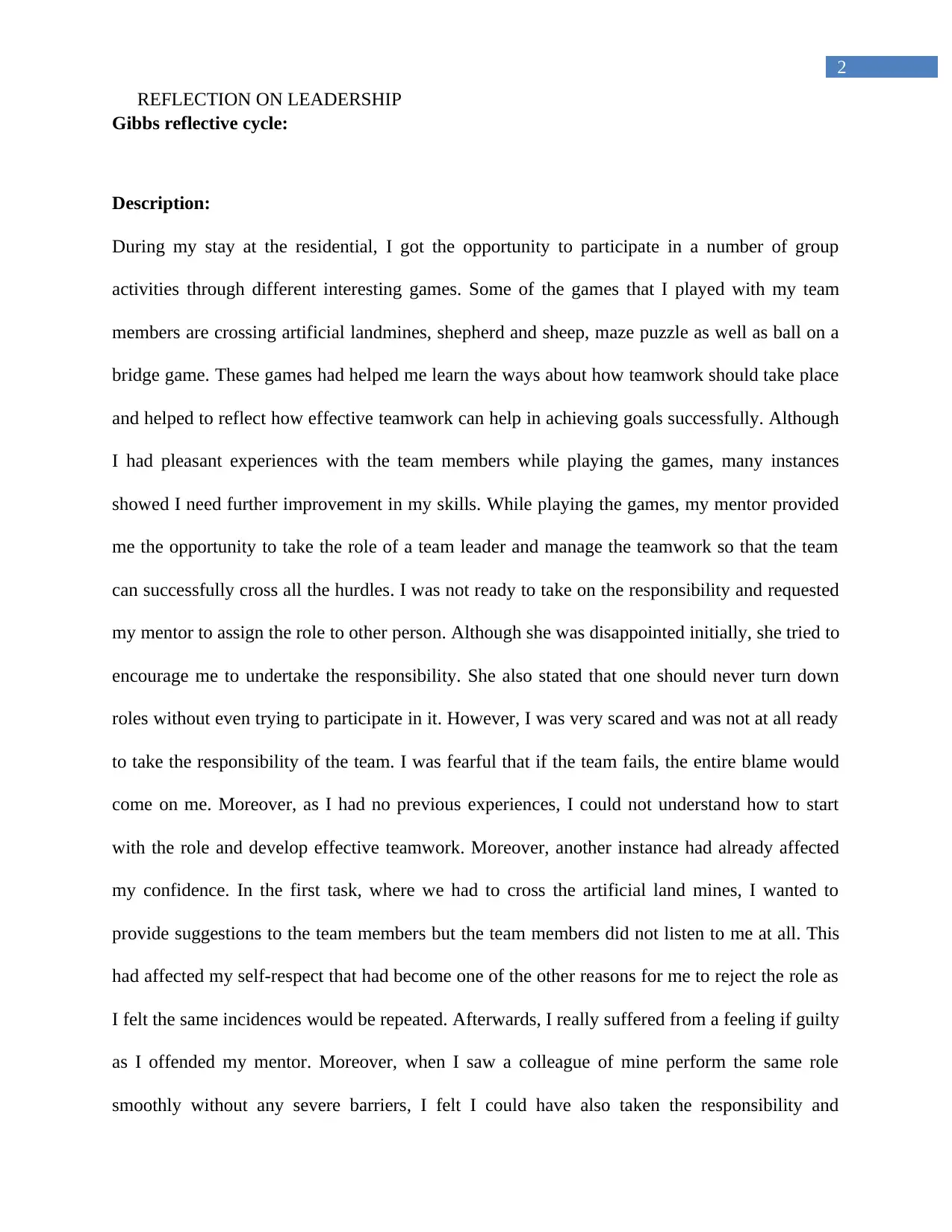
2
REFLECTION ON LEADERSHIP
Gibbs reflective cycle:
Description:
During my stay at the residential, I got the opportunity to participate in a number of group
activities through different interesting games. Some of the games that I played with my team
members are crossing artificial landmines, shepherd and sheep, maze puzzle as well as ball on a
bridge game. These games had helped me learn the ways about how teamwork should take place
and helped to reflect how effective teamwork can help in achieving goals successfully. Although
I had pleasant experiences with the team members while playing the games, many instances
showed I need further improvement in my skills. While playing the games, my mentor provided
me the opportunity to take the role of a team leader and manage the teamwork so that the team
can successfully cross all the hurdles. I was not ready to take on the responsibility and requested
my mentor to assign the role to other person. Although she was disappointed initially, she tried to
encourage me to undertake the responsibility. She also stated that one should never turn down
roles without even trying to participate in it. However, I was very scared and was not at all ready
to take the responsibility of the team. I was fearful that if the team fails, the entire blame would
come on me. Moreover, as I had no previous experiences, I could not understand how to start
with the role and develop effective teamwork. Moreover, another instance had already affected
my confidence. In the first task, where we had to cross the artificial land mines, I wanted to
provide suggestions to the team members but the team members did not listen to me at all. This
had affected my self-respect that had become one of the other reasons for me to reject the role as
I felt the same incidences would be repeated. Afterwards, I really suffered from a feeling if guilty
as I offended my mentor. Moreover, when I saw a colleague of mine perform the same role
smoothly without any severe barriers, I felt I could have also taken the responsibility and
REFLECTION ON LEADERSHIP
Gibbs reflective cycle:
Description:
During my stay at the residential, I got the opportunity to participate in a number of group
activities through different interesting games. Some of the games that I played with my team
members are crossing artificial landmines, shepherd and sheep, maze puzzle as well as ball on a
bridge game. These games had helped me learn the ways about how teamwork should take place
and helped to reflect how effective teamwork can help in achieving goals successfully. Although
I had pleasant experiences with the team members while playing the games, many instances
showed I need further improvement in my skills. While playing the games, my mentor provided
me the opportunity to take the role of a team leader and manage the teamwork so that the team
can successfully cross all the hurdles. I was not ready to take on the responsibility and requested
my mentor to assign the role to other person. Although she was disappointed initially, she tried to
encourage me to undertake the responsibility. She also stated that one should never turn down
roles without even trying to participate in it. However, I was very scared and was not at all ready
to take the responsibility of the team. I was fearful that if the team fails, the entire blame would
come on me. Moreover, as I had no previous experiences, I could not understand how to start
with the role and develop effective teamwork. Moreover, another instance had already affected
my confidence. In the first task, where we had to cross the artificial land mines, I wanted to
provide suggestions to the team members but the team members did not listen to me at all. This
had affected my self-respect that had become one of the other reasons for me to reject the role as
I felt the same incidences would be repeated. Afterwards, I really suffered from a feeling if guilty
as I offended my mentor. Moreover, when I saw a colleague of mine perform the same role
smoothly without any severe barriers, I felt I could have also taken the responsibility and
⊘ This is a preview!⊘
Do you want full access?
Subscribe today to unlock all pages.

Trusted by 1+ million students worldwide
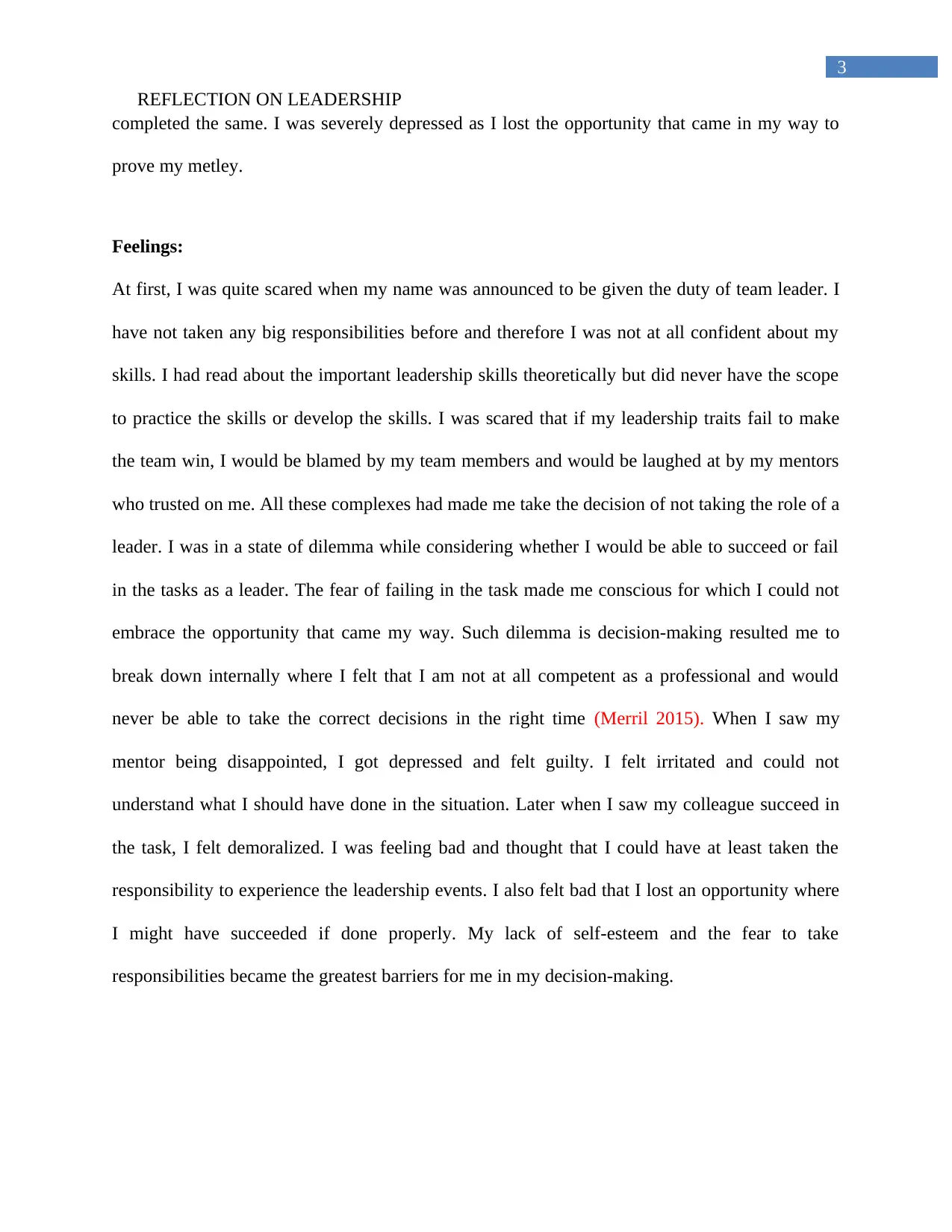
3
REFLECTION ON LEADERSHIP
completed the same. I was severely depressed as I lost the opportunity that came in my way to
prove my metley.
Feelings:
At first, I was quite scared when my name was announced to be given the duty of team leader. I
have not taken any big responsibilities before and therefore I was not at all confident about my
skills. I had read about the important leadership skills theoretically but did never have the scope
to practice the skills or develop the skills. I was scared that if my leadership traits fail to make
the team win, I would be blamed by my team members and would be laughed at by my mentors
who trusted on me. All these complexes had made me take the decision of not taking the role of a
leader. I was in a state of dilemma while considering whether I would be able to succeed or fail
in the tasks as a leader. The fear of failing in the task made me conscious for which I could not
embrace the opportunity that came my way. Such dilemma is decision-making resulted me to
break down internally where I felt that I am not at all competent as a professional and would
never be able to take the correct decisions in the right time (Merril 2015). When I saw my
mentor being disappointed, I got depressed and felt guilty. I felt irritated and could not
understand what I should have done in the situation. Later when I saw my colleague succeed in
the task, I felt demoralized. I was feeling bad and thought that I could have at least taken the
responsibility to experience the leadership events. I also felt bad that I lost an opportunity where
I might have succeeded if done properly. My lack of self-esteem and the fear to take
responsibilities became the greatest barriers for me in my decision-making.
REFLECTION ON LEADERSHIP
completed the same. I was severely depressed as I lost the opportunity that came in my way to
prove my metley.
Feelings:
At first, I was quite scared when my name was announced to be given the duty of team leader. I
have not taken any big responsibilities before and therefore I was not at all confident about my
skills. I had read about the important leadership skills theoretically but did never have the scope
to practice the skills or develop the skills. I was scared that if my leadership traits fail to make
the team win, I would be blamed by my team members and would be laughed at by my mentors
who trusted on me. All these complexes had made me take the decision of not taking the role of a
leader. I was in a state of dilemma while considering whether I would be able to succeed or fail
in the tasks as a leader. The fear of failing in the task made me conscious for which I could not
embrace the opportunity that came my way. Such dilemma is decision-making resulted me to
break down internally where I felt that I am not at all competent as a professional and would
never be able to take the correct decisions in the right time (Merril 2015). When I saw my
mentor being disappointed, I got depressed and felt guilty. I felt irritated and could not
understand what I should have done in the situation. Later when I saw my colleague succeed in
the task, I felt demoralized. I was feeling bad and thought that I could have at least taken the
responsibility to experience the leadership events. I also felt bad that I lost an opportunity where
I might have succeeded if done properly. My lack of self-esteem and the fear to take
responsibilities became the greatest barriers for me in my decision-making.
Paraphrase This Document
Need a fresh take? Get an instant paraphrase of this document with our AI Paraphraser
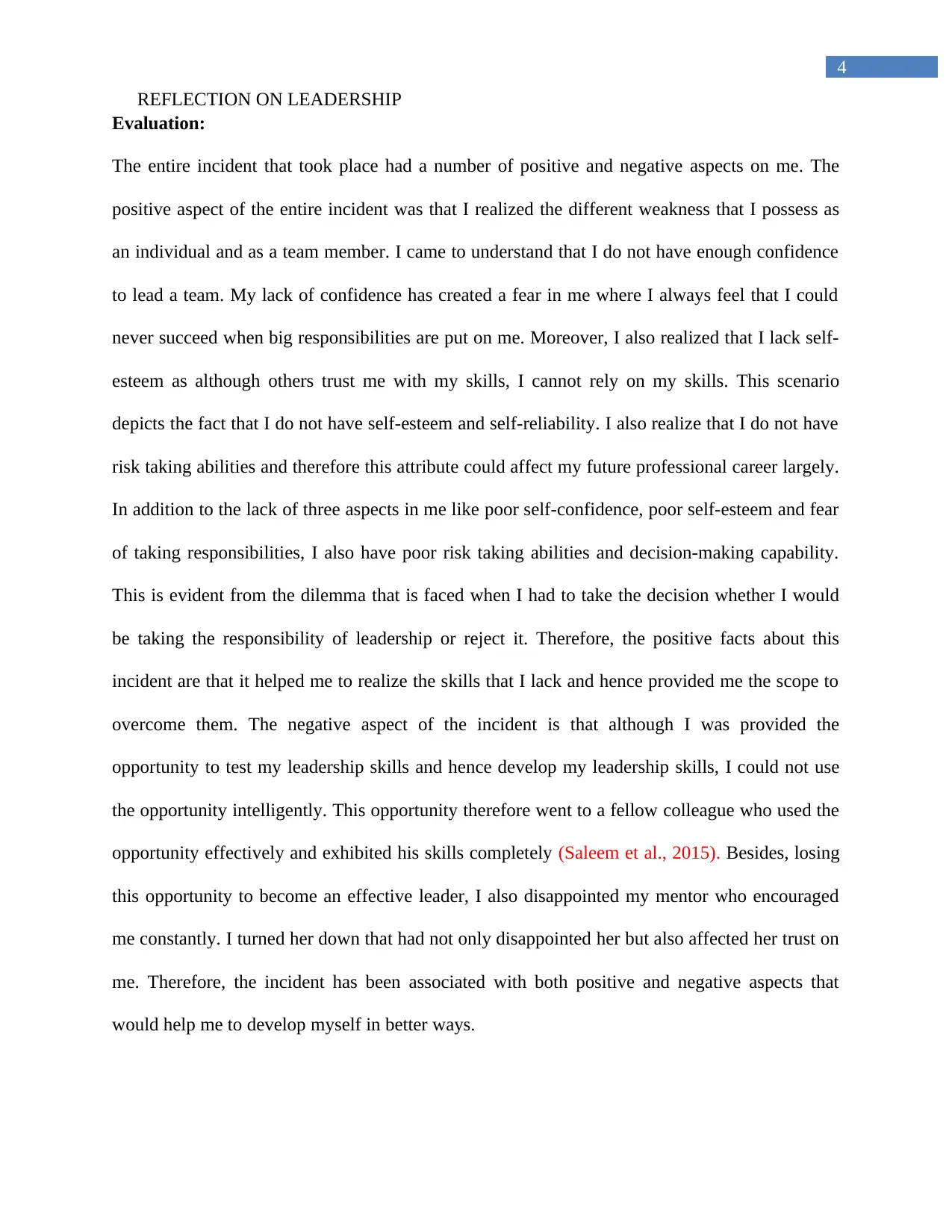
4
REFLECTION ON LEADERSHIP
Evaluation:
The entire incident that took place had a number of positive and negative aspects on me. The
positive aspect of the entire incident was that I realized the different weakness that I possess as
an individual and as a team member. I came to understand that I do not have enough confidence
to lead a team. My lack of confidence has created a fear in me where I always feel that I could
never succeed when big responsibilities are put on me. Moreover, I also realized that I lack self-
esteem as although others trust me with my skills, I cannot rely on my skills. This scenario
depicts the fact that I do not have self-esteem and self-reliability. I also realize that I do not have
risk taking abilities and therefore this attribute could affect my future professional career largely.
In addition to the lack of three aspects in me like poor self-confidence, poor self-esteem and fear
of taking responsibilities, I also have poor risk taking abilities and decision-making capability.
This is evident from the dilemma that is faced when I had to take the decision whether I would
be taking the responsibility of leadership or reject it. Therefore, the positive facts about this
incident are that it helped me to realize the skills that I lack and hence provided me the scope to
overcome them. The negative aspect of the incident is that although I was provided the
opportunity to test my leadership skills and hence develop my leadership skills, I could not use
the opportunity intelligently. This opportunity therefore went to a fellow colleague who used the
opportunity effectively and exhibited his skills completely (Saleem et al., 2015). Besides, losing
this opportunity to become an effective leader, I also disappointed my mentor who encouraged
me constantly. I turned her down that had not only disappointed her but also affected her trust on
me. Therefore, the incident has been associated with both positive and negative aspects that
would help me to develop myself in better ways.
REFLECTION ON LEADERSHIP
Evaluation:
The entire incident that took place had a number of positive and negative aspects on me. The
positive aspect of the entire incident was that I realized the different weakness that I possess as
an individual and as a team member. I came to understand that I do not have enough confidence
to lead a team. My lack of confidence has created a fear in me where I always feel that I could
never succeed when big responsibilities are put on me. Moreover, I also realized that I lack self-
esteem as although others trust me with my skills, I cannot rely on my skills. This scenario
depicts the fact that I do not have self-esteem and self-reliability. I also realize that I do not have
risk taking abilities and therefore this attribute could affect my future professional career largely.
In addition to the lack of three aspects in me like poor self-confidence, poor self-esteem and fear
of taking responsibilities, I also have poor risk taking abilities and decision-making capability.
This is evident from the dilemma that is faced when I had to take the decision whether I would
be taking the responsibility of leadership or reject it. Therefore, the positive facts about this
incident are that it helped me to realize the skills that I lack and hence provided me the scope to
overcome them. The negative aspect of the incident is that although I was provided the
opportunity to test my leadership skills and hence develop my leadership skills, I could not use
the opportunity intelligently. This opportunity therefore went to a fellow colleague who used the
opportunity effectively and exhibited his skills completely (Saleem et al., 2015). Besides, losing
this opportunity to become an effective leader, I also disappointed my mentor who encouraged
me constantly. I turned her down that had not only disappointed her but also affected her trust on
me. Therefore, the incident has been associated with both positive and negative aspects that
would help me to develop myself in better ways.
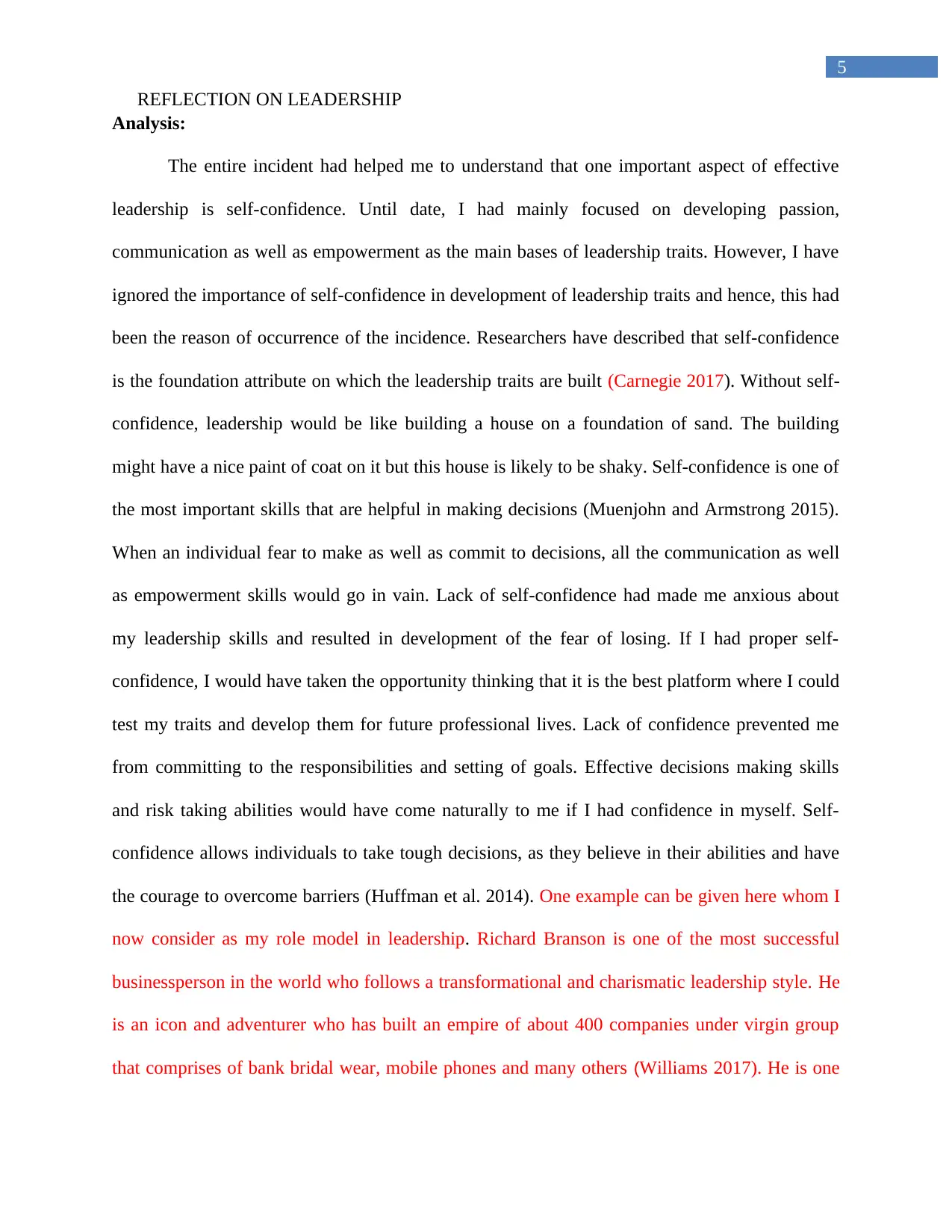
5
REFLECTION ON LEADERSHIP
Analysis:
The entire incident had helped me to understand that one important aspect of effective
leadership is self-confidence. Until date, I had mainly focused on developing passion,
communication as well as empowerment as the main bases of leadership traits. However, I have
ignored the importance of self-confidence in development of leadership traits and hence, this had
been the reason of occurrence of the incidence. Researchers have described that self-confidence
is the foundation attribute on which the leadership traits are built (Carnegie 2017). Without self-
confidence, leadership would be like building a house on a foundation of sand. The building
might have a nice paint of coat on it but this house is likely to be shaky. Self-confidence is one of
the most important skills that are helpful in making decisions (Muenjohn and Armstrong 2015).
When an individual fear to make as well as commit to decisions, all the communication as well
as empowerment skills would go in vain. Lack of self-confidence had made me anxious about
my leadership skills and resulted in development of the fear of losing. If I had proper self-
confidence, I would have taken the opportunity thinking that it is the best platform where I could
test my traits and develop them for future professional lives. Lack of confidence prevented me
from committing to the responsibilities and setting of goals. Effective decisions making skills
and risk taking abilities would have come naturally to me if I had confidence in myself. Self-
confidence allows individuals to take tough decisions, as they believe in their abilities and have
the courage to overcome barriers (Huffman et al. 2014). One example can be given here whom I
now consider as my role model in leadership. Richard Branson is one of the most successful
businessperson in the world who follows a transformational and charismatic leadership style. He
is an icon and adventurer who has built an empire of about 400 companies under virgin group
that comprises of bank bridal wear, mobile phones and many others (Williams 2017). He is one
REFLECTION ON LEADERSHIP
Analysis:
The entire incident had helped me to understand that one important aspect of effective
leadership is self-confidence. Until date, I had mainly focused on developing passion,
communication as well as empowerment as the main bases of leadership traits. However, I have
ignored the importance of self-confidence in development of leadership traits and hence, this had
been the reason of occurrence of the incidence. Researchers have described that self-confidence
is the foundation attribute on which the leadership traits are built (Carnegie 2017). Without self-
confidence, leadership would be like building a house on a foundation of sand. The building
might have a nice paint of coat on it but this house is likely to be shaky. Self-confidence is one of
the most important skills that are helpful in making decisions (Muenjohn and Armstrong 2015).
When an individual fear to make as well as commit to decisions, all the communication as well
as empowerment skills would go in vain. Lack of self-confidence had made me anxious about
my leadership skills and resulted in development of the fear of losing. If I had proper self-
confidence, I would have taken the opportunity thinking that it is the best platform where I could
test my traits and develop them for future professional lives. Lack of confidence prevented me
from committing to the responsibilities and setting of goals. Effective decisions making skills
and risk taking abilities would have come naturally to me if I had confidence in myself. Self-
confidence allows individuals to take tough decisions, as they believe in their abilities and have
the courage to overcome barriers (Huffman et al. 2014). One example can be given here whom I
now consider as my role model in leadership. Richard Branson is one of the most successful
businessperson in the world who follows a transformational and charismatic leadership style. He
is an icon and adventurer who has built an empire of about 400 companies under virgin group
that comprises of bank bridal wear, mobile phones and many others (Williams 2017). He is one
⊘ This is a preview!⊘
Do you want full access?
Subscribe today to unlock all pages.

Trusted by 1+ million students worldwide
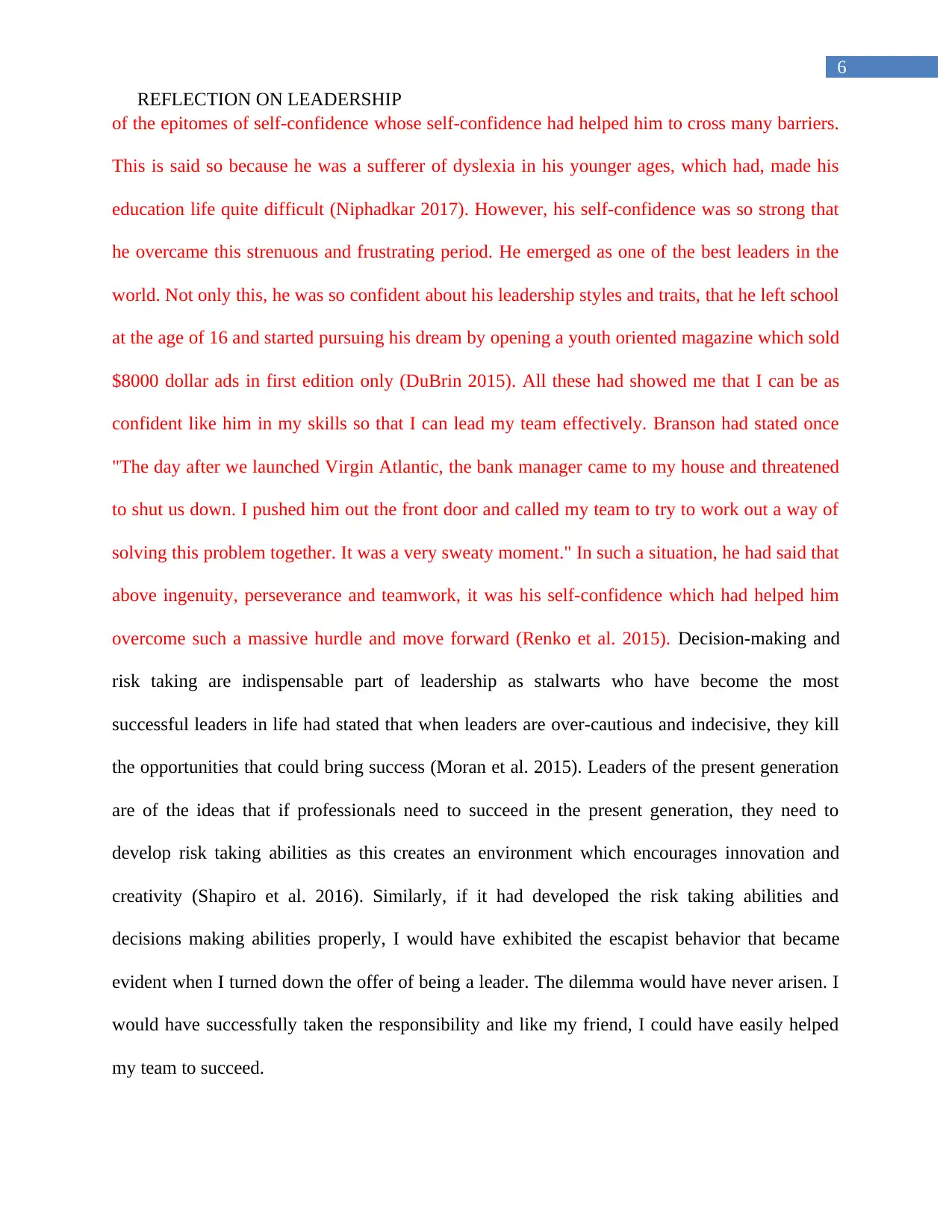
6
REFLECTION ON LEADERSHIP
of the epitomes of self-confidence whose self-confidence had helped him to cross many barriers.
This is said so because he was a sufferer of dyslexia in his younger ages, which had, made his
education life quite difficult (Niphadkar 2017). However, his self-confidence was so strong that
he overcame this strenuous and frustrating period. He emerged as one of the best leaders in the
world. Not only this, he was so confident about his leadership styles and traits, that he left school
at the age of 16 and started pursuing his dream by opening a youth oriented magazine which sold
$8000 dollar ads in first edition only (DuBrin 2015). All these had showed me that I can be as
confident like him in my skills so that I can lead my team effectively. Branson had stated once
"The day after we launched Virgin Atlantic, the bank manager came to my house and threatened
to shut us down. I pushed him out the front door and called my team to try to work out a way of
solving this problem together. It was a very sweaty moment." In such a situation, he had said that
above ingenuity, perseverance and teamwork, it was his self-confidence which had helped him
overcome such a massive hurdle and move forward (Renko et al. 2015). Decision-making and
risk taking are indispensable part of leadership as stalwarts who have become the most
successful leaders in life had stated that when leaders are over-cautious and indecisive, they kill
the opportunities that could bring success (Moran et al. 2015). Leaders of the present generation
are of the ideas that if professionals need to succeed in the present generation, they need to
develop risk taking abilities as this creates an environment which encourages innovation and
creativity (Shapiro et al. 2016). Similarly, if it had developed the risk taking abilities and
decisions making abilities properly, I would have exhibited the escapist behavior that became
evident when I turned down the offer of being a leader. The dilemma would have never arisen. I
would have successfully taken the responsibility and like my friend, I could have easily helped
my team to succeed.
REFLECTION ON LEADERSHIP
of the epitomes of self-confidence whose self-confidence had helped him to cross many barriers.
This is said so because he was a sufferer of dyslexia in his younger ages, which had, made his
education life quite difficult (Niphadkar 2017). However, his self-confidence was so strong that
he overcame this strenuous and frustrating period. He emerged as one of the best leaders in the
world. Not only this, he was so confident about his leadership styles and traits, that he left school
at the age of 16 and started pursuing his dream by opening a youth oriented magazine which sold
$8000 dollar ads in first edition only (DuBrin 2015). All these had showed me that I can be as
confident like him in my skills so that I can lead my team effectively. Branson had stated once
"The day after we launched Virgin Atlantic, the bank manager came to my house and threatened
to shut us down. I pushed him out the front door and called my team to try to work out a way of
solving this problem together. It was a very sweaty moment." In such a situation, he had said that
above ingenuity, perseverance and teamwork, it was his self-confidence which had helped him
overcome such a massive hurdle and move forward (Renko et al. 2015). Decision-making and
risk taking are indispensable part of leadership as stalwarts who have become the most
successful leaders in life had stated that when leaders are over-cautious and indecisive, they kill
the opportunities that could bring success (Moran et al. 2015). Leaders of the present generation
are of the ideas that if professionals need to succeed in the present generation, they need to
develop risk taking abilities as this creates an environment which encourages innovation and
creativity (Shapiro et al. 2016). Similarly, if it had developed the risk taking abilities and
decisions making abilities properly, I would have exhibited the escapist behavior that became
evident when I turned down the offer of being a leader. The dilemma would have never arisen. I
would have successfully taken the responsibility and like my friend, I could have easily helped
my team to succeed.
Paraphrase This Document
Need a fresh take? Get an instant paraphrase of this document with our AI Paraphraser
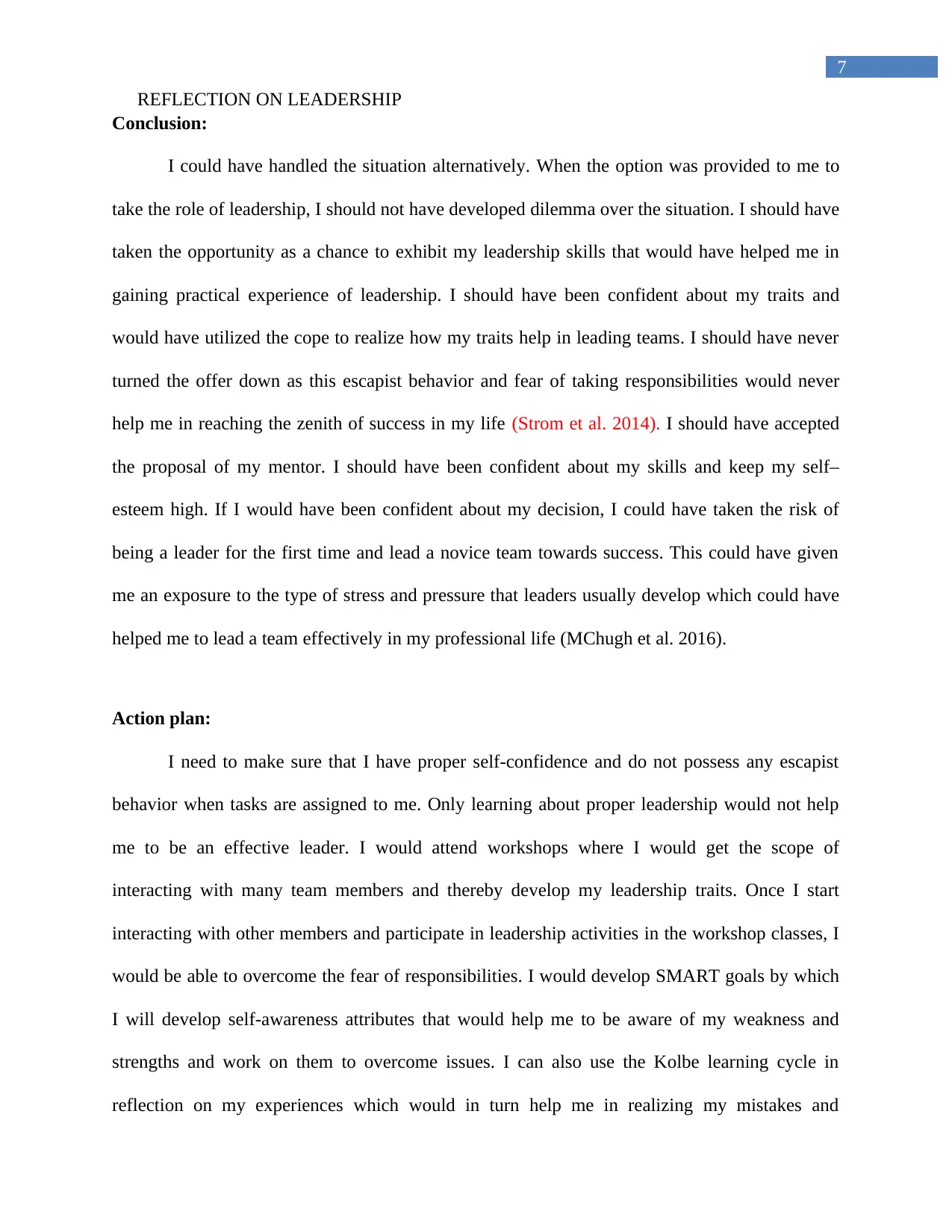
7
REFLECTION ON LEADERSHIP
Conclusion:
I could have handled the situation alternatively. When the option was provided to me to
take the role of leadership, I should not have developed dilemma over the situation. I should have
taken the opportunity as a chance to exhibit my leadership skills that would have helped me in
gaining practical experience of leadership. I should have been confident about my traits and
would have utilized the cope to realize how my traits help in leading teams. I should have never
turned the offer down as this escapist behavior and fear of taking responsibilities would never
help me in reaching the zenith of success in my life (Strom et al. 2014). I should have accepted
the proposal of my mentor. I should have been confident about my skills and keep my self–
esteem high. If I would have been confident about my decision, I could have taken the risk of
being a leader for the first time and lead a novice team towards success. This could have given
me an exposure to the type of stress and pressure that leaders usually develop which could have
helped me to lead a team effectively in my professional life (MChugh et al. 2016).
Action plan:
I need to make sure that I have proper self-confidence and do not possess any escapist
behavior when tasks are assigned to me. Only learning about proper leadership would not help
me to be an effective leader. I would attend workshops where I would get the scope of
interacting with many team members and thereby develop my leadership traits. Once I start
interacting with other members and participate in leadership activities in the workshop classes, I
would be able to overcome the fear of responsibilities. I would develop SMART goals by which
I will develop self-awareness attributes that would help me to be aware of my weakness and
strengths and work on them to overcome issues. I can also use the Kolbe learning cycle in
reflection on my experiences which would in turn help me in realizing my mistakes and
REFLECTION ON LEADERSHIP
Conclusion:
I could have handled the situation alternatively. When the option was provided to me to
take the role of leadership, I should not have developed dilemma over the situation. I should have
taken the opportunity as a chance to exhibit my leadership skills that would have helped me in
gaining practical experience of leadership. I should have been confident about my traits and
would have utilized the cope to realize how my traits help in leading teams. I should have never
turned the offer down as this escapist behavior and fear of taking responsibilities would never
help me in reaching the zenith of success in my life (Strom et al. 2014). I should have accepted
the proposal of my mentor. I should have been confident about my skills and keep my self–
esteem high. If I would have been confident about my decision, I could have taken the risk of
being a leader for the first time and lead a novice team towards success. This could have given
me an exposure to the type of stress and pressure that leaders usually develop which could have
helped me to lead a team effectively in my professional life (MChugh et al. 2016).
Action plan:
I need to make sure that I have proper self-confidence and do not possess any escapist
behavior when tasks are assigned to me. Only learning about proper leadership would not help
me to be an effective leader. I would attend workshops where I would get the scope of
interacting with many team members and thereby develop my leadership traits. Once I start
interacting with other members and participate in leadership activities in the workshop classes, I
would be able to overcome the fear of responsibilities. I would develop SMART goals by which
I will develop self-awareness attributes that would help me to be aware of my weakness and
strengths and work on them to overcome issues. I can also use the Kolbe learning cycle in
reflection on my experiences which would in turn help me in realizing my mistakes and
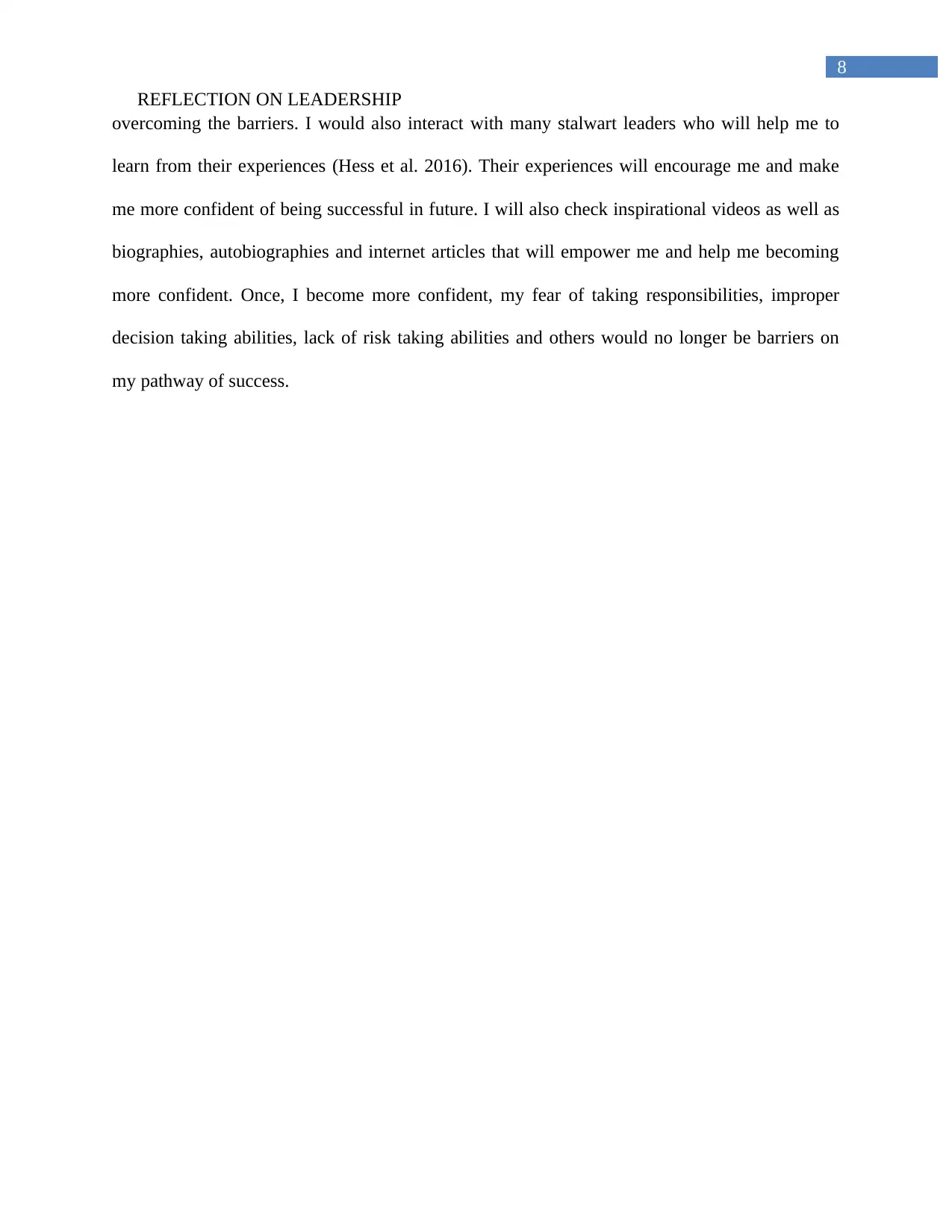
8
REFLECTION ON LEADERSHIP
overcoming the barriers. I would also interact with many stalwart leaders who will help me to
learn from their experiences (Hess et al. 2016). Their experiences will encourage me and make
me more confident of being successful in future. I will also check inspirational videos as well as
biographies, autobiographies and internet articles that will empower me and help me becoming
more confident. Once, I become more confident, my fear of taking responsibilities, improper
decision taking abilities, lack of risk taking abilities and others would no longer be barriers on
my pathway of success.
REFLECTION ON LEADERSHIP
overcoming the barriers. I would also interact with many stalwart leaders who will help me to
learn from their experiences (Hess et al. 2016). Their experiences will encourage me and make
me more confident of being successful in future. I will also check inspirational videos as well as
biographies, autobiographies and internet articles that will empower me and help me becoming
more confident. Once, I become more confident, my fear of taking responsibilities, improper
decision taking abilities, lack of risk taking abilities and others would no longer be barriers on
my pathway of success.
⊘ This is a preview!⊘
Do you want full access?
Subscribe today to unlock all pages.

Trusted by 1+ million students worldwide
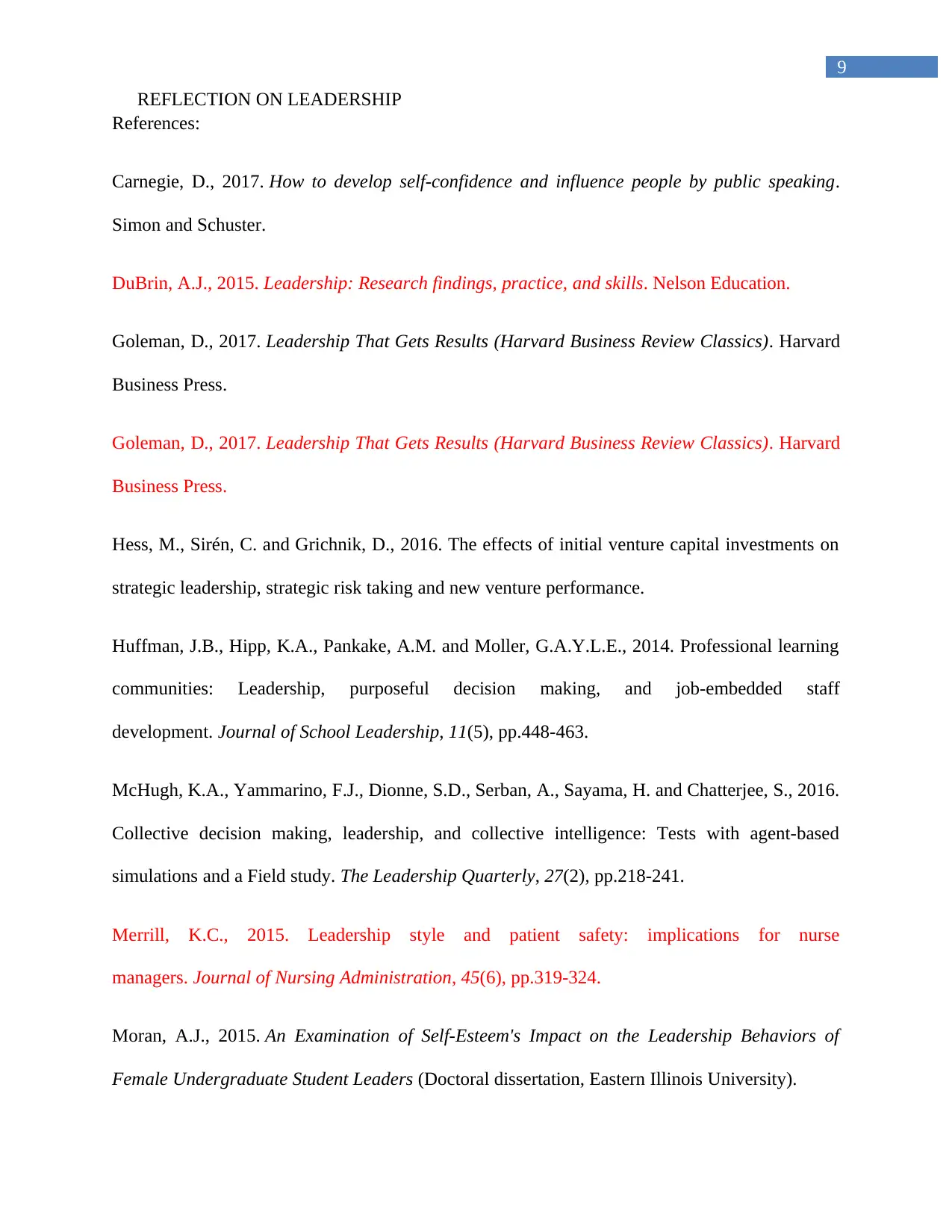
9
REFLECTION ON LEADERSHIP
References:
Carnegie, D., 2017. How to develop self-confidence and influence people by public speaking.
Simon and Schuster.
DuBrin, A.J., 2015. Leadership: Research findings, practice, and skills. Nelson Education.
Goleman, D., 2017. Leadership That Gets Results (Harvard Business Review Classics). Harvard
Business Press.
Goleman, D., 2017. Leadership That Gets Results (Harvard Business Review Classics). Harvard
Business Press.
Hess, M., Sirén, C. and Grichnik, D., 2016. The effects of initial venture capital investments on
strategic leadership, strategic risk taking and new venture performance.
Huffman, J.B., Hipp, K.A., Pankake, A.M. and Moller, G.A.Y.L.E., 2014. Professional learning
communities: Leadership, purposeful decision making, and job-embedded staff
development. Journal of School Leadership, 11(5), pp.448-463.
McHugh, K.A., Yammarino, F.J., Dionne, S.D., Serban, A., Sayama, H. and Chatterjee, S., 2016.
Collective decision making, leadership, and collective intelligence: Tests with agent-based
simulations and a Field study. The Leadership Quarterly, 27(2), pp.218-241.
Merrill, K.C., 2015. Leadership style and patient safety: implications for nurse
managers. Journal of Nursing Administration, 45(6), pp.319-324.
Moran, A.J., 2015. An Examination of Self-Esteem's Impact on the Leadership Behaviors of
Female Undergraduate Student Leaders (Doctoral dissertation, Eastern Illinois University).
REFLECTION ON LEADERSHIP
References:
Carnegie, D., 2017. How to develop self-confidence and influence people by public speaking.
Simon and Schuster.
DuBrin, A.J., 2015. Leadership: Research findings, practice, and skills. Nelson Education.
Goleman, D., 2017. Leadership That Gets Results (Harvard Business Review Classics). Harvard
Business Press.
Goleman, D., 2017. Leadership That Gets Results (Harvard Business Review Classics). Harvard
Business Press.
Hess, M., Sirén, C. and Grichnik, D., 2016. The effects of initial venture capital investments on
strategic leadership, strategic risk taking and new venture performance.
Huffman, J.B., Hipp, K.A., Pankake, A.M. and Moller, G.A.Y.L.E., 2014. Professional learning
communities: Leadership, purposeful decision making, and job-embedded staff
development. Journal of School Leadership, 11(5), pp.448-463.
McHugh, K.A., Yammarino, F.J., Dionne, S.D., Serban, A., Sayama, H. and Chatterjee, S., 2016.
Collective decision making, leadership, and collective intelligence: Tests with agent-based
simulations and a Field study. The Leadership Quarterly, 27(2), pp.218-241.
Merrill, K.C., 2015. Leadership style and patient safety: implications for nurse
managers. Journal of Nursing Administration, 45(6), pp.319-324.
Moran, A.J., 2015. An Examination of Self-Esteem's Impact on the Leadership Behaviors of
Female Undergraduate Student Leaders (Doctoral dissertation, Eastern Illinois University).
Paraphrase This Document
Need a fresh take? Get an instant paraphrase of this document with our AI Paraphraser
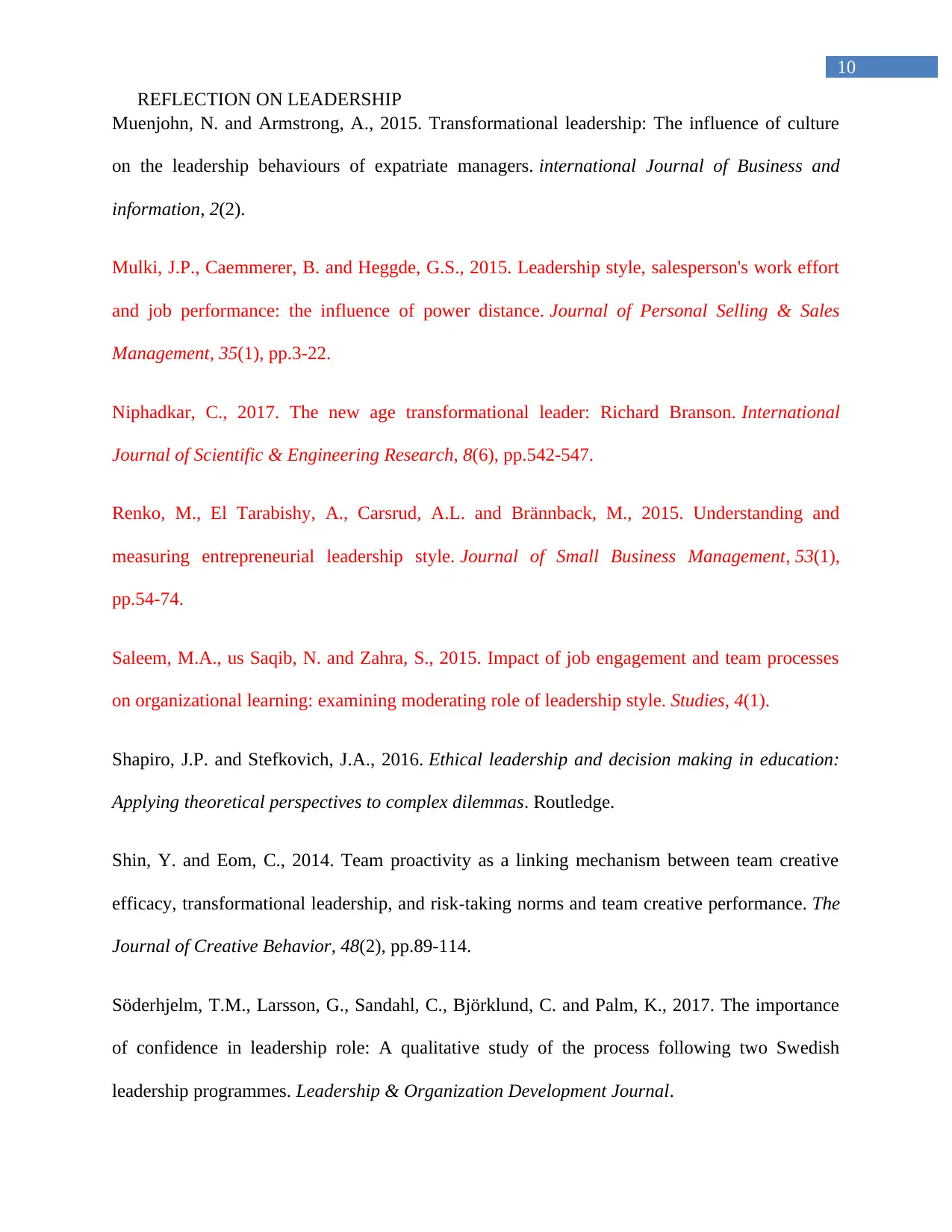
10
REFLECTION ON LEADERSHIP
Muenjohn, N. and Armstrong, A., 2015. Transformational leadership: The influence of culture
on the leadership behaviours of expatriate managers. international Journal of Business and
information, 2(2).
Mulki, J.P., Caemmerer, B. and Heggde, G.S., 2015. Leadership style, salesperson's work effort
and job performance: the influence of power distance. Journal of Personal Selling & Sales
Management, 35(1), pp.3-22.
Niphadkar, C., 2017. The new age transformational leader: Richard Branson. International
Journal of Scientific & Engineering Research, 8(6), pp.542-547.
Renko, M., El Tarabishy, A., Carsrud, A.L. and Brännback, M., 2015. Understanding and
measuring entrepreneurial leadership style. Journal of Small Business Management, 53(1),
pp.54-74.
Saleem, M.A., us Saqib, N. and Zahra, S., 2015. Impact of job engagement and team processes
on organizational learning: examining moderating role of leadership style. Studies, 4(1).
Shapiro, J.P. and Stefkovich, J.A., 2016. Ethical leadership and decision making in education:
Applying theoretical perspectives to complex dilemmas. Routledge.
Shin, Y. and Eom, C., 2014. Team proactivity as a linking mechanism between team creative
efficacy, transformational leadership, and risk‐taking norms and team creative performance. The
Journal of Creative Behavior, 48(2), pp.89-114.
Söderhjelm, T.M., Larsson, G., Sandahl, C., Björklund, C. and Palm, K., 2017. The importance
of confidence in leadership role: A qualitative study of the process following two Swedish
leadership programmes. Leadership & Organization Development Journal.
REFLECTION ON LEADERSHIP
Muenjohn, N. and Armstrong, A., 2015. Transformational leadership: The influence of culture
on the leadership behaviours of expatriate managers. international Journal of Business and
information, 2(2).
Mulki, J.P., Caemmerer, B. and Heggde, G.S., 2015. Leadership style, salesperson's work effort
and job performance: the influence of power distance. Journal of Personal Selling & Sales
Management, 35(1), pp.3-22.
Niphadkar, C., 2017. The new age transformational leader: Richard Branson. International
Journal of Scientific & Engineering Research, 8(6), pp.542-547.
Renko, M., El Tarabishy, A., Carsrud, A.L. and Brännback, M., 2015. Understanding and
measuring entrepreneurial leadership style. Journal of Small Business Management, 53(1),
pp.54-74.
Saleem, M.A., us Saqib, N. and Zahra, S., 2015. Impact of job engagement and team processes
on organizational learning: examining moderating role of leadership style. Studies, 4(1).
Shapiro, J.P. and Stefkovich, J.A., 2016. Ethical leadership and decision making in education:
Applying theoretical perspectives to complex dilemmas. Routledge.
Shin, Y. and Eom, C., 2014. Team proactivity as a linking mechanism between team creative
efficacy, transformational leadership, and risk‐taking norms and team creative performance. The
Journal of Creative Behavior, 48(2), pp.89-114.
Söderhjelm, T.M., Larsson, G., Sandahl, C., Björklund, C. and Palm, K., 2017. The importance
of confidence in leadership role: A qualitative study of the process following two Swedish
leadership programmes. Leadership & Organization Development Journal.
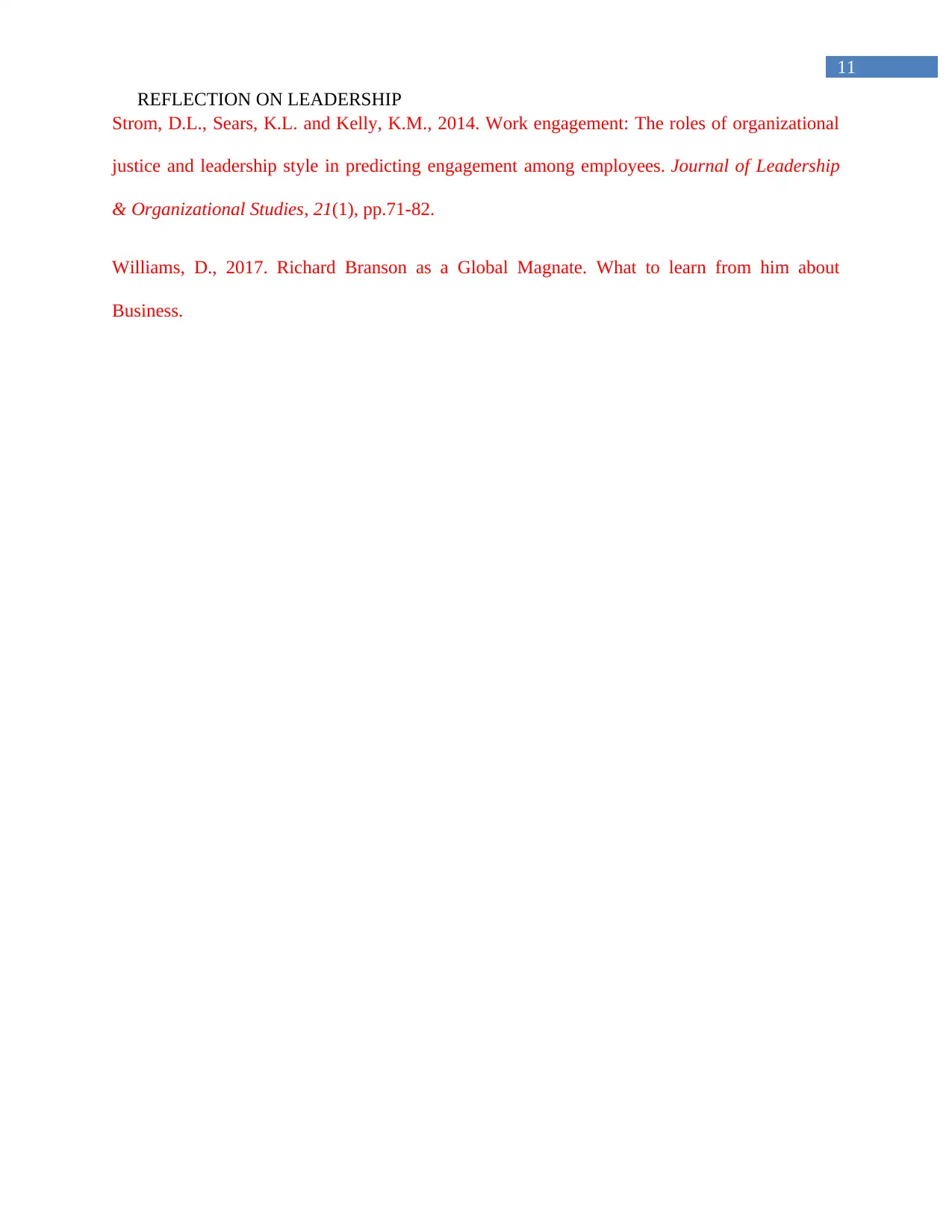
11
REFLECTION ON LEADERSHIP
Strom, D.L., Sears, K.L. and Kelly, K.M., 2014. Work engagement: The roles of organizational
justice and leadership style in predicting engagement among employees. Journal of Leadership
& Organizational Studies, 21(1), pp.71-82.
Williams, D., 2017. Richard Branson as a Global Magnate. What to learn from him about
Business.
REFLECTION ON LEADERSHIP
Strom, D.L., Sears, K.L. and Kelly, K.M., 2014. Work engagement: The roles of organizational
justice and leadership style in predicting engagement among employees. Journal of Leadership
& Organizational Studies, 21(1), pp.71-82.
Williams, D., 2017. Richard Branson as a Global Magnate. What to learn from him about
Business.
⊘ This is a preview!⊘
Do you want full access?
Subscribe today to unlock all pages.

Trusted by 1+ million students worldwide
1 out of 13
Related Documents
Your All-in-One AI-Powered Toolkit for Academic Success.
+13062052269
info@desklib.com
Available 24*7 on WhatsApp / Email
![[object Object]](/_next/static/media/star-bottom.7253800d.svg)
Unlock your academic potential
Copyright © 2020–2026 A2Z Services. All Rights Reserved. Developed and managed by ZUCOL.





